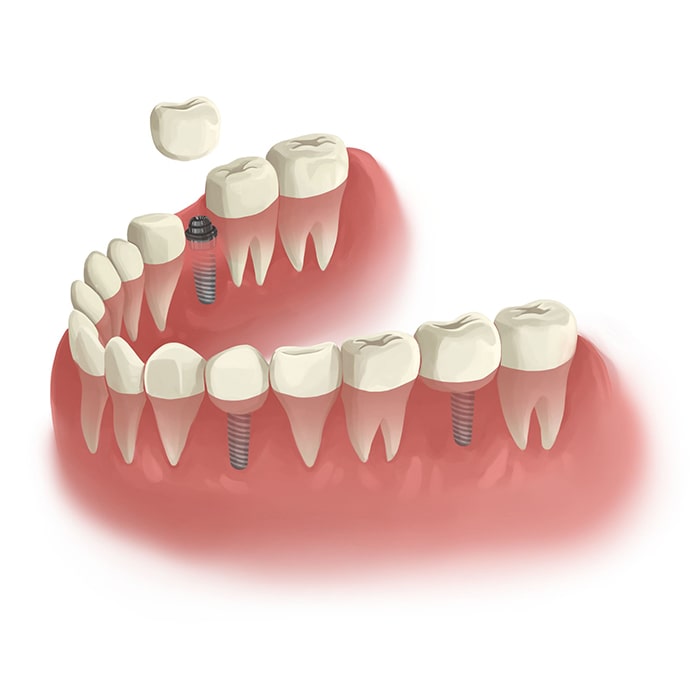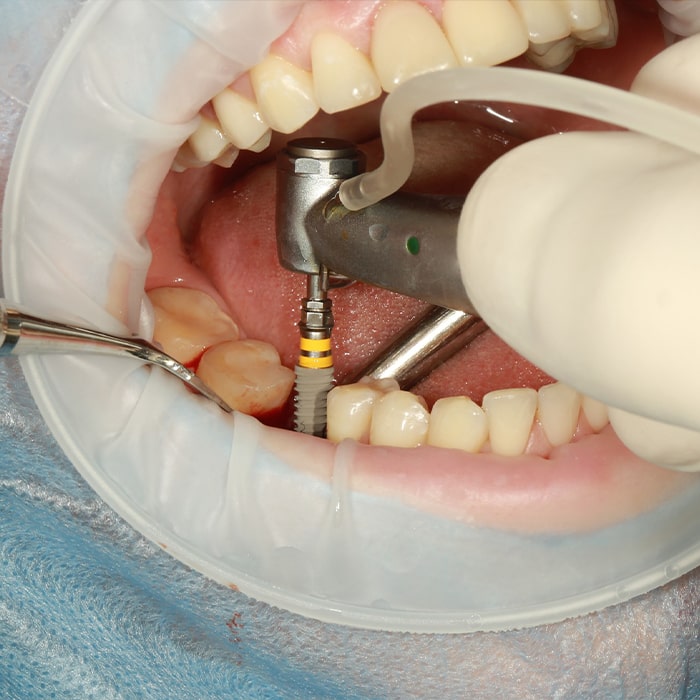Wisdom Tooth Extraction
Many people come to their dentists with questions about their wisdom teeth. Wisdom tooth extraction is a fairly straightforward procedure with nothing to worry about and can relieve pain and discomfort caused by the wisdom teeth.
Wisdom teeth got their name because these molars are the last to come in, usually between the ages of 17-21. Most people will have 4 wisdom teeth at the back of the mouth, two on top and two on bottom. In some instances these teeth are not always visible as some people will naturally have wisdom teeth missing, or may be ‘impacted’, meaning they have not fully erupted from the bone due to a lack of space.
Why are Wisdom Teeth Removed?
Dentists can typically spot the presence of a wisdom tooth visually inside the mouth. However if they are impacted (under the gums or bone) they will need an X-ray to confirm their presence. Impacted or not, wisdom teeth can have a huge impact on oral health.
Wisdom teeth can cause dental problems like infection, pain, and damage to surrounding teeth.
Some people do naturally have enough room for their wisdom teeth and may not require removal. However since wisdom teeth are the furthest back in the mouth it may be harder to clean them and make them more vulnerable to gum disease and tooth decay.
In the majority of patients, it is often advisable to have their wisdom teeth removed to prevent future problems, however this is assessed on a case by case basis.

Symptoms associated with Impacted Wisdom Teeth
- Jaw pain.
- Bad breath.
- Tender or bleeding gums.
- Swelling in gums.
- Difficulty opening the mouth.
- Gum disease (Periodontal disease).
Benefits of Wisdom Teeth Removal
- Risks of cysts, jaw damage, and tumors are reduced.
- Prevents damage to the surrounding teeth.
- Fewer oral problems in future.
- The risk of inflammation and pain are reduced.
What to Expect with Wisdom Tooth Removal at First Point Dental.
The dental surgery would take 45 minutes-60 minutes. With anesthesia, the patient shouldn’t experience any pain or discomfort during the surgery. Depending on the type of sedation, you might feel asleep or conscious during the wisdom tooth extraction surgery. Wisdom tooth removal surgery is an outpatient procedure performed by a dentist or oral surgeon at a dental clinic near you. The dentist recommends the surgery if the exam and X-rays reveal the presence of impacted wisdom teeth or teeth that may become problematic with time.

- Sedation: If the patient receives nitrous oxide (laughing gas), a small mask is fitted over your nose to deliver the sedative. You will remain awake but in a relaxed state. In the event of intravenous (IV) sedation, the needle will be inserted in a vein of the arm for administration of the sedative. This is the most comfortable option of sedation as you will be sedated throughout the procedure. Note: The sedation option is best when considering comfort level, operation complexity, and multiple extractions. Talk to your dentist about any discomfort or apprehension you may have about the procedure.
- Numbing: Post sedation, your dental surgeon will numb the wisdom teeth and nearby tissues with local anesthesia. Even though you will be asleep, the body still processes pain (ie elevated heart rate) and it is important to keep you healthy and safe throughout the procedure.
- Tissue Removal: The dental surgeon will often remove gum tissue covering any portion of the wisdom tooth in order to help aid it’s removal.
- Bone Removal: Bone could partially or fully cover the impacted wisdom tooth. In that scenario, the dental surgeon would use the high-speed hand piece to remove any bone impeding it’s removal.
Loosening and Sectioning of the Tooth
If the impacted wisdom teeth are visible, the dentist will use special surgical instruments to loosen the teeth from the connective tissue. Then in the next step, the surgeon will cut the tooth into sections for easy removal of the impact wisdom teeth.
- Tooth Removal: The dentist will move to the removal stage once the wisdom teeth become completely loose or completely sectioned. In this situation, specially designed surgical instruments are deployed to remove the impact wisdom tooth.
- Stitches Procedure: Post wisdom teeth removal, the dentist might add stitches to close the operated area. The stitching becomes necessary in order to help aid the healing of each site where the tooth was removed.
Post-Surgery Care at Our Professional Dental Clinic:
- The sedation like nitrous oxide gas or IV drip is stopped post-surgery.
- The patient is given gauze to bite down to help in developing a blood clot in the mouth.
- Some patients might feel side-effects of anesthesia like dizziness, nausea, and shivering.
- The patient is put into the recovery room to check for stability and breathing rate.
Recovery after Wisdom Tooth Extraction Surgery
The first 24 hours are important for a patient’s recovery after wisdom tooth extraction surgery. It is during this time that important steps are taken in order to heal in as short amount of time as possible.
Important tips are:
- Avoid rinsing mouth aggressively. (turn your head side to side and let the fluid fall out of your mouth as opposed to swishing and spitting.)
- No straw use- suction, spitting, and swishing could cause the clot to be removed.
- Don’t brush near the extracted wisdom teeth removal location.
- Some side effects like bleeding, pain, and swelling in the mouth and cheeks will exist for some time post-surgery. Swelling usually reaches a maximum at 3 days before you notice a reduction.
- Avoid smoking and drinking.
Key Note: Your dental clinic will provide extra gauze to use on the wisdom tooth extraction site.
Wisdom Tooth Removal Cost
The wisdom tooth extraction price would differ in terms of the clinic’s location, case, and the provider removing them. Each tooth is coded with a different price based on the complexity of it’s removal, and whether or not sedation is being used. Insurance is also a significant factor and various insurances offer different coverage for these procedures. First Point Dental offer’s free exams and we would be happy to provide you with your exact cost at that time!
